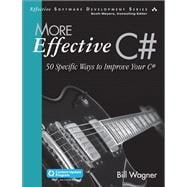In More Effective C#, Second Edition, world-renowned .NET expert Bill Wagner identifies and illuminates 50 intermediate-to-advanced techniques for writing exceptionally robust and well-performing C# 7.0 code. Reflecting the growing sophistication of the C# language and its development community, Wagner presents powerful new solutions to problems you’re likely to encounter every day.
Through three editions of Effective C#, Wagner’s clear explanations, expert tips, and realistic code examples have proven invaluable to hundreds of thousands of developers. With the publication of this title, Effective C#, Third Edition, and More Effective C#, Second Edition, have been completely reorganized to provide clear explanations, expert tips, and realistic code examples in a cohesive package for modern C#. More Effective C#, Second Edition, brings the same proven approach to the new features in C# 7.0, helping you perform familiar tasks more efficiently and effectively.
Drawing on his unsurpassed C# experience and key role on global C# standards committees, Wagner addresses object-oriented, functional, and service-oriented approaches to managing data with C#; better ways to express your intent to users and other programmers; and new opportunities to leverage powerful asynchronous and dynamic programming techniques.
- Use properties instead of accessible data members (Item 1)
- Distinguish between value and reference types (Item 4)
- Understand relationships among multiple concepts of equality (Item 9)
- Avoid conversion operators in your APIs (Item 11)
- Understand how interface and virtual methods differ (Item 15)
- Avoid overloading methods defined in base classes (Item 19)
- Create method groups that are clear, minimal, and complete (Item 22)
- Enable immediate error reporting in iterators and async methods (Item 26)
- Use async methods for async work (Item 27)
- Avoid thread allocations and context switches (Item 30)
- Construct PLINQ parallel algorithms with exceptions in mind (Item 36)
- Use the thread pool instead of creating threads (Item 37)
- Use BackgroundWorker for cross-thread communication (Item 38)
- Use the smallest possible scope for lock handles (Item 41)
- Understand the pros and cons of dynamic programming (Item 43)
- Make full use of the expression API (Item 46)
- Minimize dynamic objects in public APIs (Item 47)
You’re already a successful C# programmer: this book will make you an outstanding one.
Content Update Program: This title is no longer part of the Content Update Program. The content is final, and no further updates will be released.








